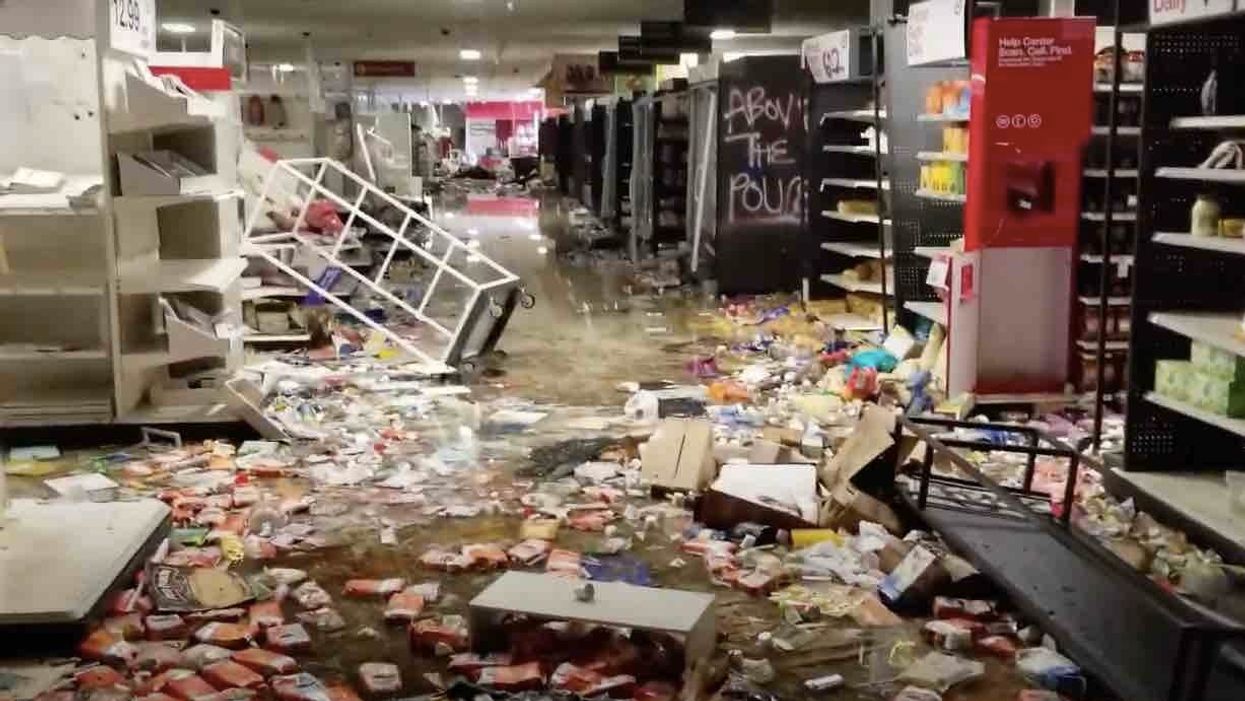
Image source: YouTube screenshot

A goal of Target's new racial justice committee is to 'create environments where Black guests feel overtly welcome'
A Target store in South Minneapolis became an emblem of protests and rioting that took place nationwide after the death of George Floyd in late May, as the store was looted and ransacked in broad daylight as cameras rolled:
Minneapolis Target looted as protests turn more violentyoutu.be
And now, nearly six months later, the same store is reopening,
Bloomberg reported — but with a focus on serving the needs of black customers.
The interior of the store was overhauled, the outlet said, with the pharmacy moved to the front of the store so elderly customers can easily get their prescriptions and the grocery stocked with spices requested by the local community while the lighting for the crosswalk from the nearby rail station was upgraded, and the entrance was made more inviting with a new mural and plants.
Bloomberg noted that Target is a retailer long associated with white suburban shoppers — and executives said the overhaul is part of an effort to improve its image with black customers. Indeed, the outlet said the Minneapolis store drew shoppers from areas twice as black as a typical Target, according to cellphone data tracked by SafeGraph.
"By being based in Minneapolis — by being based in the eye of the storm of George Floyd — they had a huge responsibility to produce a pretty elaborate plan," Anthony Thompson, a professor of clinical law and a founding faculty director of the Center on Race, Inequality and the Law at New York University, told Bloomberg of Target's decision to raze and reconstruct the store.
More from the outlet:
It's not exactly clear why this specific store was targeted; protesters originally headed there for milk to relieve the pain from being tear gassed. But in rebuilding, Target realized the surrounding neighborhood had never been asked point-blank whether the store that's been there since 1976 was serving it well. It wasn't.
The litany of complaints was long. And even though a remodel in 2018 fixed earlier perceptions the store was dirty, poorly stocked and a bit of an afterthought, some White residents in the Longfellow neighborhood would still drive to a different Target instead, derogatorily referring to the location — and its customers — as "Tar-ghetto."
So the roughly $80 billion corporation did something it hadn't before: met with Black residents, employees and community organizers (over Zoom; it's 2020 after all) to ask what they wanted to see in the reconstructed store.
Target hired a contracting company owned by a Somali-American woman and built some of those neighborhood requests into its blueprints. It also added shutters to the store that can come down in case of future emergencies.
Bloomberg added that Target laid out the
goals of its new racial justice committee in August, including the need to "create environments where Black guests feel overtly welcome," which implied many didn't.
Kiera Fernandez, the corporation's chief diversity and inclusion officer and vice president of human resources, acknowledged to the outlet that Target does have a reputation of catering to white shoppers — but that it's working on building more relationships with black entrepreneurs by stocking their products. But Bloomberg noted that Target hasn't committed to signing the 15% Pledge, a promise to fill shelves with that percentage of products made by black-owned brands.
"Target is not going to be able to end systemic racism," Stephanie Creary, assistant professor of management at the University of Pennsylvania's Wharton School, told the outlet. "Target is going to be able to reduce the impact of racism that is created from its operations. That's what we're looking at."
Laysha Ward, Target's chief external engagement officer and the only black executive who reports directly to CEO Brian Cornell, added to Bloomberg: "We're really thinking about this relevant experience that is overtly Black and reflecting overtly Black needs and culture. We have to make sure that the solutions we're putting forward are informed by the insights of our own Black team members, our Black guests, the Black community."
More from the outlet:
For the most part, local residents are excited to see the retailer reopen. Even though the Minneapolis-based company used to be seen as touting its national philanthropic efforts while largely ignoring South Minneapolis's actual needs, its relationship with the neighborhood has come a long way since May. While the Lake Street site was closed, it worked with community partners to distribute essential goods like diapers. The community now feels it has a direct line to corporate headquarters, Majors said.
It will also be one of few fully operational stores in the still recovering neighborhood. Other local groceries, including an Aldi, were temporarily closed after the protests left parts of the area in rubble, while the other local supermarket, Cub Foods, kept operating from under a tent. The police precinct still sits empty, and the post office is still mostly rubble after burning during the spring unrest.
ThoMalik Watkins told Bloomberg he'll shop at the overhauled Target but believes it's responsible to the community not only in regard to what it sells but also for how it treats employees, making products easy to access, and promoting black-owned brands.
"Not saying you need to have signs all through your store that say 'Black Lives Matter,'" Watkins added to the outlet. "But I think it's important that they join the discussion, especially if that's the community that you're in and taking people's money."
The Trashed Target Store: Minneapolis Riot Aftermath #2youtu.be